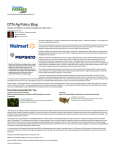FDA grants GRAS status to Palatinose sugar replacer
for its sugar replacer Palatinose, a certification the company
hopes will provide food manufacturers with "complete
assurance" in the product.
The Generally Recognized as Safe (GRAS) registration was granted last month by the US Food and Drug Administration (FDA).
In its consideration of Palatinose, also known under the generic name isomaltulose, the FDA reviewed studies that demonstrated that the product is completely hydrolysed and absorbed in the small intestine as glucose and fructose. Biological data, toxicological and metabolic studies as well as research into gastrointestinal tolerance concluded that the use of Palatinos presents no health concerns, said the company in a statement.
Palatinose, which was until now self-affirmed GRAS, is a disaccharide derived from sucrose.
The product claims to have a sweetness profile similar to that of sugar, but the company says it has "more scope for flavor development."
In July 2005 the product received novel food status, the European equivalent of GRAS. And in Japan it has been used as a food ingredient since 1985.
"The FDA's 'letter of no objection' paves the way for Palatinose to be used in a wide range of food and beverage products, including ready-to-drink and instant beverages, snack bars, dairy products as well as energy-reduced, wellness and sports foods and meal replacements," said Palatinit, a subsidiary of leading global sugar producer Südzucker AG.
The company claims that the sugar replacer not only maintains sweetness but also has a low glycemic effect and can be used to enhance the nutritional value of foods since it is digested much more slowly than sucrose, providing energy over a longer time period.
The low-glycemic trend is widely held to have taken up the baton from low-carb as a popular approach to dietary weight loss.
Originally developed as a means to help manage diabetes, the low-glycemic diet favors slow release carbohydrates such as whole grains, most fruits, vegetables, nuts, and legumes over those which release energy quickly, like white bread, refined breakfast cereals, and concentrated sugars, which cause blood sugar levels to spike.
Palatinit says that its Palatinose product is non-hygroscopic, making it ideal in instant drinks as it does not lump and remains dispersible. In dairy products, too, Palatinose can be used as a carbohydrate because it is resistant to fermentation by the surrounding microbes and lactobacilli.
Palatinose is also applicable in weight control and 'slimming' products. Liquid meal replacements with milk, fruit or cereal as well as instant tea and specialty coffee could also be repositioned in the wellness sector with Palatinose.












